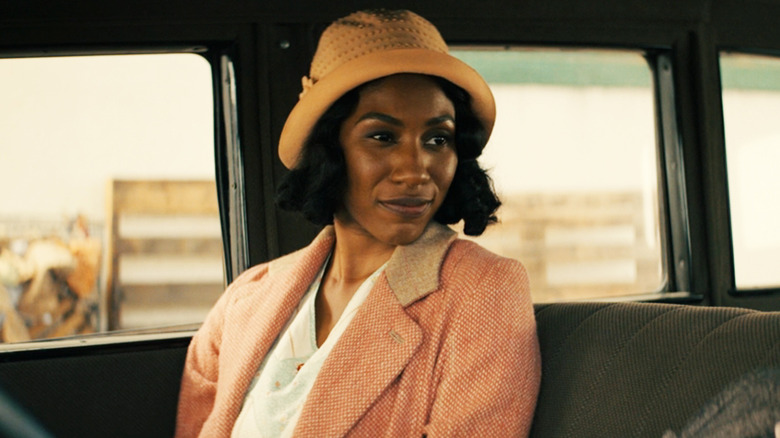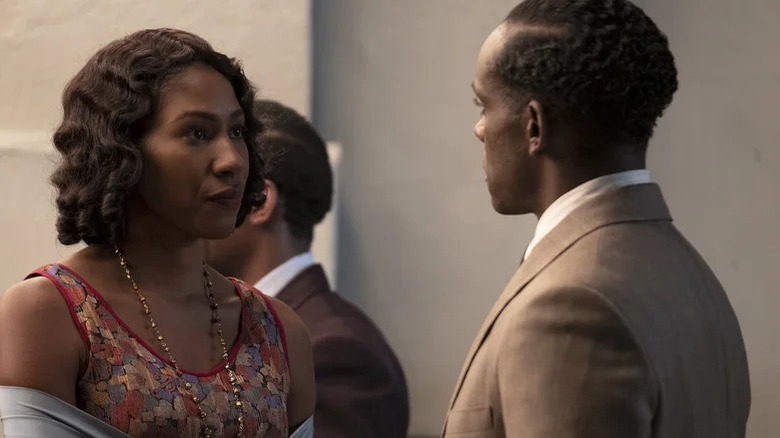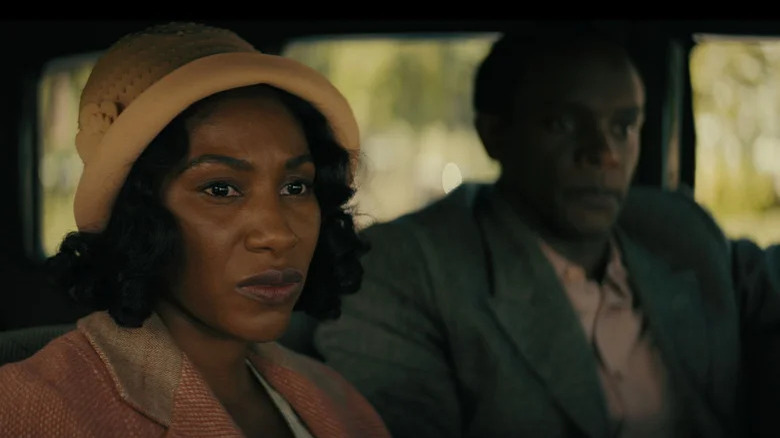Perry Mason Star Diarra Kilpatrick Used A Piece Of Her Childhood To Inspire Clara [Exclusive]
This post contains spoilers for "Perry Mason" season 2
By far the best part about "Perry Mason" season 2 is the fact the series has given its supporting characters more to do. That goes especially for Juliet Rylance's Della Street and Chris Chalk's Paul Drake, Mason's co-counsel and investigator respectively.
As the season has played out, Drake in particular has had an emotional character arc that's seen the principled ex-cop struggle to maintain his sense of morality after enduring some fairly harrowing experiences. One such experience saw him forced to beat a low-level gangster even after he'd got the intel he needed — an act that comes back to haunt Drake in the form of the boy's orange Converse sneakers, which repeatedly reappear around L.A. in the sixth episode.
All of this is leading to what is sure to be a breaking point for Drake. And while many expected that moment to come in the seventh episode, instead, Drake's wife Clara (Diarra Kilpatrick) staves off his impending meltdown, stepping in to assist her husband in his dogged pursuit of the case he's investigating and giving him a respite from the relentless stress he's endured. As Clara takes over Drake's stake-out and spots the very car her husband had been looking for, she suddenly becomes involved in the investigation, sneaking inside the house they drive to and very nearly being caught.
It's a great moment for Clara, as she sheds the embattled housewife persona and takes on a whole new aspect. But it's also great to see Kilpatrick taking on more, especially seeing as the actress clearly took her role seriously coming into the show — forming a detailed backstory for Clara that she still refers to now.
Kilpatrick's family history formed part of Clara
Chris Chalk has spoken about how Clara was the one character that kept Drake going after he hit a turning point in episode 4 of season 2. As the actor put it, "It's Clara that gets Paul to get his s*** together." And Clara has been that way since the first season, where she stood by her husband as he endured a crisis of conscience while investigating a case and being pressured by corrupt cops to change his reports — not to mention the pervasive racism he had to endure throughout.
Diarra Kilpatrick recently spoke to /Film, where she reflected on how Clara has, "grown in the universe and how she's become such a bedrock of support for her husband." But Clara is much more than a steadfast partner, and Kilpatrick found it exciting to explore more of her character this season. The actress explained how she'd conceived of a whole backstory for Clara. And, asked if there was anything from her personal history that she incorporated into her backstory, she remembered a family reunion in South Carolina where her aunt recalled burying her mother before moving the family to Detroit:
"We spent a long time in the heat looking for this marker, this gravestone of [her aunt's] mother. She's like 90-something and she's like, 'I know we put the marker down. I know we did. It was the last thing we did before we left.' And everybody's out there, and finally, we found it. Her mother, Mary Campbell. So I did borrow that piece of burying my mother and that being the last thing that was keeping her there and then moving on to what was hoped to be a better life."
The realism of Perry Mason
It's unclear how Diarra Kilpatrick's childhood memory played into Clara Drake in "Perry Mason," beyond being part of a backstory in which the actress presumably envisioned Clara leaving somewhere else behind in order to move to L.A. Of course, there have been numerous times when Clara has had to "move on" as part of the show's narrative, most notably after her husband quits the LAPD and the couple is forced to move in with Clara's brother. Also, In episode 6 of the first season, Paul has Clara leave to stay with her aunt, out of fear that she could be in danger due to Paul agreeing to help Perry Mason with his case.
For now, it's nice to know that Clara, who is just one example of how the characters of "Perry Mason" feel very much like real people, is truly animated by real-life experiences. For Chris Chalk, the show's realism has often been depressing, especially as he has to continually revisit the reality of life for people of color in 1930s LA, and realize much of the same issues persist today. But the realism that characterizes much of "Perry Mason" is also one of its main strengths, emphasizing the show's willingness to go beyond the glamorous surface of LA in 1932 and showcase the city's sordid underbelly and the horrific societal attitudes that pervaded that time and place. In Clara's case, however, both her love for her husband and her confidence in helping out with investigations feels like it comes from a real place, and provide an undeniably positive element to the show.
The season finale of "Perry Mason" airs on HBO on Monday, April 24.


